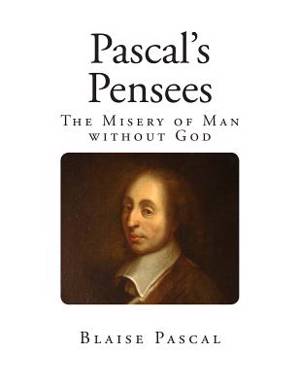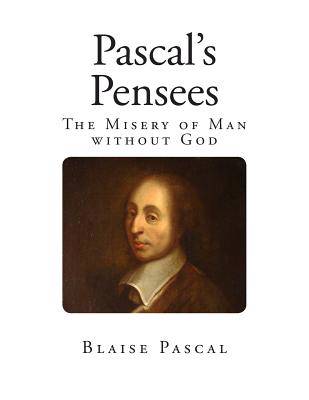
- Retrait gratuit dans votre magasin Club
- 7.000.000 titres dans notre catalogue
- Payer en toute sécurité
- Toujours un magasin près de chez vous
- Retrait gratuit dans votre magasin Club
- 7.000.0000 titres dans notre catalogue
- Payer en toute sécurité
- Toujours un magasin près de chez vous
17,45 €
+ 34 points
Description
Pascal's Pensées The Misery of Man without God By Blaise Pascal BRAND NEW COPY Introduction By T. S. Eliot The Pensées (literally, "thoughts") represented a defense of the Christian religion by Blaise Pascal, the renowned 17th century philosopher and mathematician. Pascal's religious conversion led him into a life of asceticism, and the Pensées was in many ways his life's work. The concept (but not the term) "Pascal's Wager" stems from a portion of this work. The Pensées is in fact a name given posthumously to his fragments, which he had been preparing for an Apology for the Christian Religion and which was never completed. It might seem that about Blaise Pascal, and about the two works on which his fame is founded, everything that there is to say had been said. The details of his life are as fully known as we can expect to know them; his mathematical and physical discoveries have been treated many times; his religious sentiment and his theological views have been discussed again and again; and his prose style has been analysed by French critics down to the finest particular. But Pascal is one of those writers who will be and who must be studied afresh by men in every generation. It is not he who changes, but we who change. It is not our knowledge of him that increases, but our world that alters and our attitudes towards it. The history of human opinions of Pascal and of men of his stature is a part of the history of humanity. That indicates his permanent importance. The facts of Pascal's life, so far as they are necessary for this brief introduction to the Pensées, are as follows. He was born at Clermont, in Auvergne, in 1623. His family were people of substance of the upper middle class. His father was a government official, who was able to leave, when he died, a sufficient patrimony to his one son and his two daughters. In 1631 the father moved to Paris, and a few years later took up another government post at Rouen. Wherever he lived, the elder Pascal seems to have mingled with some of the best society, and with men of eminence in science and the arts. Blaise was educated entirely by his father at home. He was exceedingly precocious, indeed excessively precocious, for his application to studies in childhood and adolescence impaired his health, and is held responsible for his death at thirty-nine. Prodigious, though not incredible stories are preserved, especially of his precocity in mathematics. His mind was active rather than accumulative; he showed from his earliest years that disposition to find things out for himself, which has characterised the infancy[Pg viii] of Clerk-Maxwell and other scientists. Of his later discoveries in physics there is no need for mention here; it must only be remembered that he counts as one of the greatest physicists and mathematicians of all time; and that his discoveries were made during the years when most scientists are still apprentices.
Spécifications
Parties prenantes
- Auteur(s) :
- Editeur:
Contenu
- Nombre de pages :
- 226
- Langue:
- Anglais
Caractéristiques
- EAN:
- 9781490394084
- Date de parution :
- 09-06-13
- Format:
- Livre broché
- Format numérique:
- Trade paperback (VS)
- Dimensions :
- 216 mm x 279 mm
- Poids :
- 535 g

Les avis
Nous publions uniquement les avis qui respectent les conditions requises. Consultez nos conditions pour les avis.






